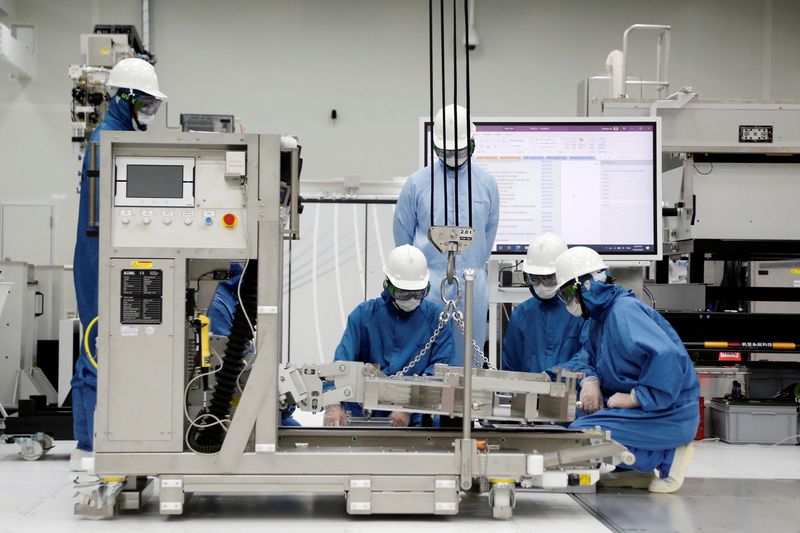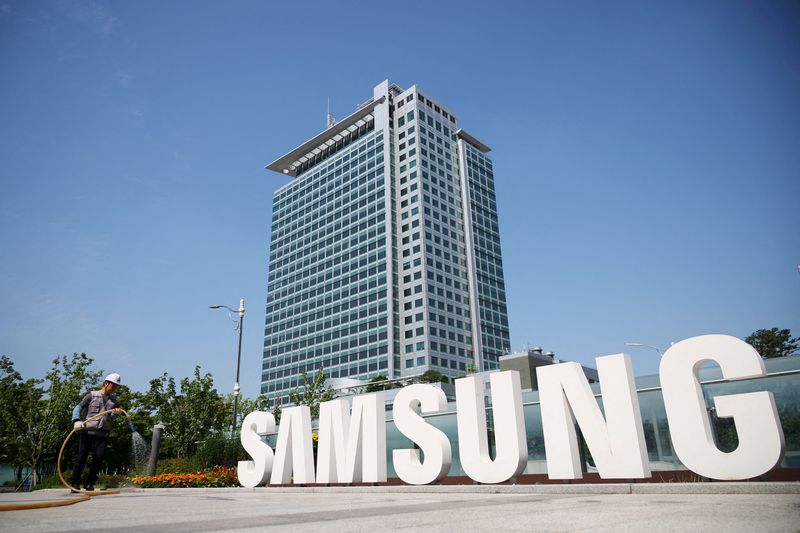By Heekyong Yang, Hyunjoo Jin and Toby Sterling
SEOUL (Reuters) - Samsung Electronics (KS:005930) has postponed taking deliveries of ASML (AS:ASML) chipmaking equipment for its upcoming factory in Texas as it has yet to win any major customers for the project, three people familiar with the matter said.
Samsung has been also holding off on placing orders to some other suppliers for the $17 billion factory in Taylor city, prompting them to look for other customers and send staff deployed on site back home, three other people familiar with the matter said.
The delay in equipment deliveries is a fresh setback to the Taylor project, which is at the heart of Samsung chairman Jay Y. Lee's ambition to expand beyond its bread-and-butter memory chips into contract chip manufacturing, which Taiwan's TSMC dominates.
It underscores the widening gulf between Samsung and rivals such as TSMC and SK Hynix which are ramping up production of high-end chips to cater to booming demand from artificial intelligence applications.
ASML, the world's biggest chipmaking equipment supplier, cut its 2025 sales forecast on Tuesday, citing weakness in markets other than AI, and delayed fabs.
The Dutch company did not name clients who have delayed their fabs. Reuters is the first to report that Samsung has pushed back deliveries of some ASML equipment.
Two of the sources said the delayed shipments to Samsung's Taylor factory involve ASML's advanced chipmaking equipment called extreme ultraviolet (EUV) lithography.
One of them said the deliveries were scheduled earlier this year but the machines have not been shipped yet. The third source said Samsung has pushed back delivery of some ASML equipment to the factory, without elaborating on the equipment or the revised delivery schedule.
EUV machines, which cost around $200 million each, create design features on silicon wafers by using beams of light and are widely used to manufacture advanced chips found in smartphones, electronic devices and AI servers.
It was not clear how many EUV machines Samsung had ordered or what payment terms it had entered into.
ASML and Samsung declined to comment on the ASML matter. All of the sources Reuters spoke to declined to be identified as they were not authorised to talk to the media.
'STRANDED ASSET'
Samsung said in April production at the Taylor plant would begin in 2026 instead of 2024. Samsung's Lee told Reuters earlier this month that the company was facing challenges on the factory.
Sources and analysts said there was a risk of further delays.
"Without new volume clients, even the 2026 timetable looks challenging... We see a possibility of a further delay and an asset write-off," Macquarie analysts said in a September report, adding the fab could be "a stranded asset".
Lee Min-hee, an analyst at BNK Investment & Securities, said that if Samsung does not place orders for other equipment by early next year, it could signal further delays, given the lead time required to start production.
The South Korean firm aims to complete construction of the building by early next year, a person familiar with the matter said.
Samsung said in a statement to Reuters that there is no change to its plan to start production of its Taylor fab in 2026, and the return of its personnel is part of a routine rotational shift.
WIDENING GAP WITH TSMC
Despite years of efforts to take on TSMC, Samsung's market share in contract manufacturing, done in factories known as fabs or foundries in the semiconductor industry, dropped 8 percentage points in the last five years to 11% as of the first quarter of 2024, while TSMC's market share rose to 61.7% over the same period, according to data from research firm Statista.
Samsung's market share erosion underscores technological challenges the firm faces in mastering advanced chip manufacturing to lure the likes of Apple (NASDAQ:AAPL) and Nvidia (NASDAQ:NVDA) away from TSMC, analysts said.
ASML finance chief Roger Dassen said on Tuesday that there are "very specific competitive issues in the foundry business", and some customers are slowly ramping up production of advanced chips and delaying fabs.
Analysts say Intel (NASDAQ:INTC), which is suffering one of its worst periods and cut its capital spending plan for 2025, is also partly the reason for ASML's weaker outlook.
By contrast, TSMC expected on Thursday its first fab in Arizona to see volume production in 2025 and said the factory has received strong commitment from U.S. customers.
Samsung's struggles in its foundry business has also impacted its factories in South Korea, where it is grappling with low production yields of its most advanced 3-nanometer chips, people familiar with the matter said. Samsung is also delaying investments into new foundry chip lines in the city of Pyeongtaek, south of Seoul, two of the people said.
Samsung declined to comment on the Korean factory matter.
Reflecting Samsung's slowing capacity expansion, ASML reported that sales to South Korea - home to Samsung and its smaller rival SK Hynix - shrunk by one-third in the third quarter to 889 million euros ($965 million) from the previous quarter, according to its presentation materials.
Samsung is also losing ground in its core memory chip market, with SK Hynix outshining it to become the most dominant supplier of pricey high-bandwidth memory (HBM) chips used to build Nvidia's AI chipsets.

"I think today without AI, the market would be very sad if you ask me," ASML CEO Christophe Fouquet said in a conference call this week, adding a slower-than-expected recovery for mobile devices and PCs will extend into next year.
($1 = 0.9213 euros)
